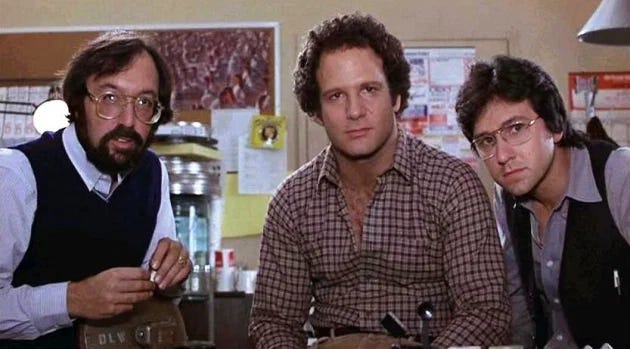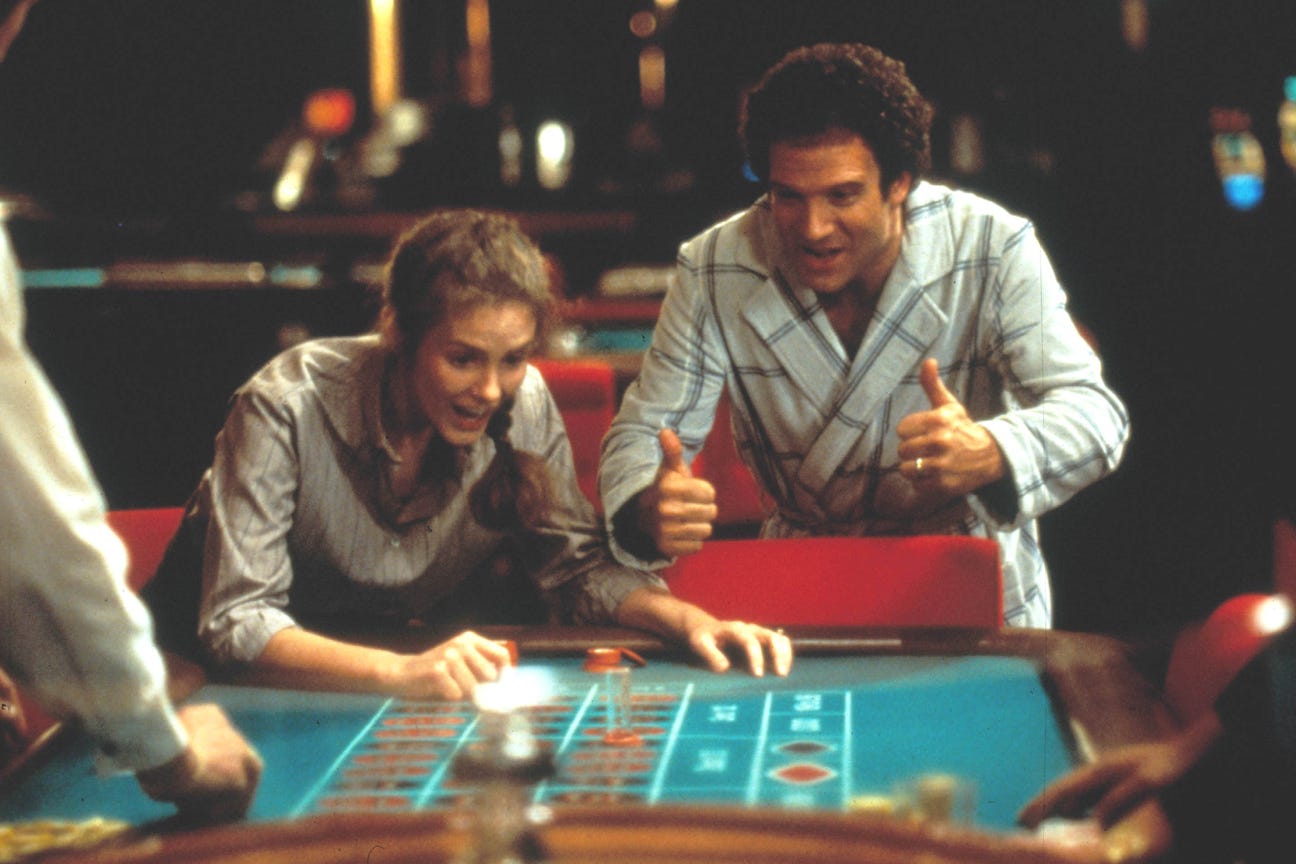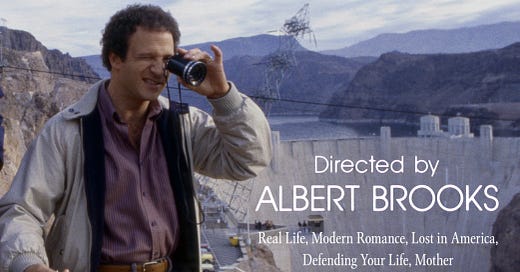Criterion throws an Albert Brooks party
And we dig into the reasons that's good news for everyone
It’s Saturday, September 19, and here’s where we are…
I never knew I wanted to hear Morgan Freeman read the stage directions for Fast Times At Ridgemont High to Brad Pitt while Julia Roberts cackled softly in the background, but, man, I did, and so do you. Trust me.


The whole live-reading phenomenon is fascinating to me. Even before everything went sideways this year, there was a burgeoning industry of people staging live-readings of scripts for older films. Jason Reitman deserves the credit for really breaking this as a form of entertainment, but there are plenty of people doing interesting things with the form now. From time to time, I participate in the readings that are staged by Scripts Gone Wild, and they are terrific fun. I am excited about the role I get to read in their upcoming Death Becomes Her event, and I think the community of guest-readers they’ve built is tremendously welcoming and fun.


That’s what these should be, of course. Right now, the trend is seeing what big celebrities you can get, and that’s fun on one level. But the best of these can illuminate new things in the text or they can give us a new look at something familiar. They depend on our relationship with the original text as much as they depend on the particular performances that evening. People made this past weekend’s Princess Bride event a huge financial success for Wisconsin Democrats, raising over $4 million from that single event. That’s amazing. In that case, I can understand the response because it was a reunion of the original cast with some wonderful surprise additions, and that film has become beloved over time.

And speaking of fun, I want to urge you to take advantage of the Criterion Channel’s programming this month. They’ve got five comedies by Albert Brooks streaming right now, and all five of them are absolute gems. There are films it feels like I’ve been recommending in a circle for 20-plus years now, and anytime I think I’m being redundant, I run into someone who’s never heard of Used Cars or Orphans or Five Corners or, god forbid, Modern Romance.
I remember seeing Siskel and Ebert review Real Life and I absolutely flipped for the concept. It made me laugh even though I wasn’t watching An American Family on PBS and I wasn’t really aware of the conversation about this weird new notion of “reality TV.” When the film arrived on cable, I made sure I saw it. Right away, I felt like I was hearing someone speak a secret language. Albert Brooks made me laugh in a way no one else made me laugh. His sense of humor seemed to be wholly original, but it made immediate sense to me. Carl Reiner gave an interview once in the Dick Van Dyke Show era where he was asked who the funniest person he knew was. Keep in mind, this is after he was part of that legendary writers room on Your Show of Shows that included Neil Simon, Woody Allen, and Larry Gelbart, among others. Reiner didn’t even hesitate. He said the funniest person he knew was a friend of his high-school-aged son Rob, a kid named Albert Einstein. That was before he took on his stage name, and it speaks to the comic confidence of this remarkable artist that he had the balls to walk into Carl Reiner’s house as a teenager and make jokes in front of Reiner and his close friend Mel Brooks.

Real Life is included in this collection, and it’s amazing looking at the film today and realizing how far ahead of things Brooks really was. The film came out in 1979, and it’s a mockumentary about a filmmaker named Albert Brooks who decides to make a movie about a real American family. He moves his crew into an average family’s home and they take over the family’s life, with Albert constantly talking about how important it is that everything they get has to be absolutely real. It’s clear that the main joke here is how completely the film crew corrupts this family’s everyday life, how there is no such thing as “real” once you introduce cameras, and how oblivious Albert is to the toxic influence he has on these people. It’s a savage comedy, and as brilliant as Brooks is, he is also a tremendous director of other actors. Charles Grodin does some of his very best work in this film as the head of the family and Frances Lee McCain is just as brilliant as his wife. You’d think that time might have dulled the sharp satirical point of the film, but it’s actually the opposite: Brooks looks even smarter and funnier now because of how much he predicted accurately about what reality TV would be.
Brooks has told the story of how Steven Spielberg passed on his contact information to Stanley Kubrick, who asked for it, and how it led to an unlikely long-distance friendship. Kubrick would become fax buddies with people, asking them to install fax machines so he could send them things at all hours, and Brooks was flattered at first. After all, Kubrick called Modern Romance one of the few perfect films, and I would tend to agree. It’s the story of a couple who breaks up. That’s pretty much how they define their relationship. The film opens with a break-up, and it closes with a break-up, and everything in-between is chaos because Robert (Brooks) and Mary (Kathryn Harrold, who has never had a better role) are toxic with one another. It’s a beautiful character piece built around some of my favorite comedy set-pieces ever. Robert taking a quaalude becomes an extended evening with his parakeet that I still quote at least once a week. There’s a scene where they’re mixing the sound for a film, with James L. Brooks playing the director of the film, that still makes me hurt from laughter every time I see it. This is the refutation of every romantic comedy you’ve ever seen and I consider it a must-watch every couple of years.

Oh, and by the way, Brooks eventually disabled his fax machine because of how much stuff Kubrick was sending. That cracks me up for reasons I can barely articulate.
The first of these films I got to see in a theater was Lost In America, and it’s another one of those films that get funnier every time I watch them. When David Howard is passed over for a promotion he believes he’s due, he has one of the funniest meltdowns of all time and storms out, fired and furious. He convinces his wife Linda to quit her job as well, they sell everything, buy an RV, and head out to discover America. It’s a great set-up, and Brooks doesn’t do anything you’d expect with the premise.

I think he writes amazing roles for women in his films. Kathryn Harrold got room to play more shades than I’ve seen from her in anything else in Modern Romance, and I would argue Julie Hagerty does her very best work here as Linda. Brooks isn’t afraid to give his co-stars material that’s just as rich and funny as the stuff he gives himself to do, and Hagerty really gets to rip in this role. He’s also great writing short roles that score big laughs, like his brother Bob Einstein’s role in Modern Romance as a very aggressive sporting-goods salesman, and the late great Garry Marshall absolutely destroys here during his scene as a casino manager.
When I first moved to LA in 1990, I was a theater manager in Sherman Oaks, and we did a lot of test screenings in our theaters. One film that was tested repeatedly that first year I was there was Defending Your Life, so I got to see the film in a few rough versions before it was finally released. Watching Brooks fight for his vision gave me a different appreciation of how hard he worked at something that he makes look effortless in the end.

In this one, Brooks plays Daniel Miller, a man who is killed in a car accident on his 39th birthday ends up in Judgment City, where he finds himself on trial to determine how he’ll spend his afterlife. He is represented by Rip Torn at his rowdy best and he ends up meeting and falling in love with Julia, played by Meryl Streep at her most incandescent. Again, it’s a great role, and Streep knows exactly how much fun to have with it. It’s a brilliant high-concept look at the way we compromise our lives out of fear, and I think over time, I’ve come to view this as his best overall movie. It’s as good at executing a high concept as Groundhog Day, but not nearly as many people saw the film, and that’s a shame.
The last of the films included in this Criterion showcase is Mother, and in some ways, it’s the simplest of the films in this group. John Henderson is a novelist who is coming off of his second divorce, and he feels fundamentally broken. He makes the impulsive decision to move home to live with his mother for a little while. He figures if he can understand his relationship with his mother, he can fix his relationship with women, a notion she finds fairly insulting. That’s it. It’s not much more complicated than that. Brooks co-wrote the film with Monica Johnson, his collaborator on all of these scripts except Defending Your Life, and it’s a wonderful two-handed character piece. Word was that Brooks originally wanted Nancy Reagan to return to acting to play the part, and I certainly wish I could have at least gotten a glimpse of that version of reality. Who knows? Maybe she would have been great in the role.

But things worked out the way they should because Debbie Reynolds played the part, and one of the ways you know the Oscars ain’t shit is because she did not win an armful of them for her work here. She’s amazing. It’s smart and funny and warm work in both directions, a comedy duet that pays off in scene after scene. It could easily be cheap set-ups and punchlines, but Brooks is always interested in the way conversation reveals our weirdest corners of personality. Ultimately, the film is about seeing your parent as a person and not just a resource, and it’s wonderful that an icon like Reynolds was able to get such a rich and rewarding piece of material to play so late in life, something that does not happen nearly often enough.
Overall, I can’t recommend this particular Criterion showcase enough. It’s far from the only good thing going on there this month, though, and I’d argue that Criterion remains one of the best overall values for serious film fans in the streaming space. They’ve got this Albert Brooks showcase, one for Jean-Luc Godard, one for Andrea Arnold, one for Orson Welles, one for Atom Egoyan, one for Powell and Pressburger, one for Fassbinder, one for Seijun Suzuki… Kurosawa, Agnes Varda, Eric Rohmer, even Herschell Gordon Lewis… all of them represented by multiple titles, carefully curated. I mean, if you just watch those films, not even stepping outside of those showcases, you’ve already more than justified the subscription, and their library really is ridiculously dense beyond that.
Okay. So. This was supposed to be the Friday Free-For-All originally, but then Friday turned out to be a non-stop garbage fire. All love and respect to the great Ruth Bader Ginsberg, who I think stands as one of the great moral public figures of the last 50 years. Losing her and John Lewis in the same year, especially a year as turbulent as 2020, has been tough, but her example is one of perseverance and strength, and the best way to honor that is to try to embody it.
I think I’ve let despair creep in around the edges of things here in the newsletter, and as I said in the last issue, I think it’s far more valuable right now to lean back into the discussion of film and TV and books, the things that you came here for in the first place. I’m going to rededicate myself to keeping the darkness at bay when I’m sitting down to write this newsletter for you. It’s easy to act like it’s all dark right now; it’s valuable to remember that it’s not.
Since this was supposed to be the Free-For-All, I’ll throw an opening question out for you today: what’s your favorite of the five Albert Brooks films I discussed above? And if you aren’t familiar with any of them, then I envy you all the laughs you’ve got to look forward to as you discover his work.
This space is for discussion of anything you’ve got on your mind. The Albert Brooks question is just the starting point. As long as you’re kind to one another, anything else is fair game, and I’m curious what you’re watching and enjoying right now. How are you keeping that darkness in perspective?
Today’s newsletter is free, so you can share it as much as you’d like. And if you’re new here, it’s only $7 a month to get every issue of the newsletter sent right to your inbox. It’s even less if you buy a full year up front.
Image courtesy of the Criterion Channel
Image courtesy of Paramount
Image courtesy of SPHE
Image(s) courtesy of Warner Bros
Image courtesy of Paramount




‘ what’s your favorite of the five Albert Brooks films I discussed above? And if you aren’t familiar with any of them, then I envy you all the laughs you’ve got to look forward to as you discover his work.’
I am one of those that has never seen any of them, sorry to say. I’ll try to correct that.
‘How are you keeping that darkness in perspective?’
Honestly I turn off the news portion of tv and limit my social media time. When news like RGB hits I just shut it all off. I believe our ‘over’ exposure to ‘everything ‘ going on this country at all times is just too much. No one can properly handle all that information at once and still keep their sanity. Turn it off and focus on the people directly involved in your life. Because, ultimately the only thing I, or most people can do , is vote blue on Nov. 3.
I have not watched any of Brooks’ films...yet. It is on my To Do list.
I finished re-listening to all of the main episodes of ‘80’s All Over this past week. You and Scott did an absolutely amazing job with this. I am sad that you couldn’t finish the decade. However, it is completely understandable why that is. Listening to the show again has been a balm for my soul. (That is no hyperbole.)
Today I started playing Ghosts of Tsushima on the PS4. This is the game that I never knew that I needed. The gameplay, graphics and story are exquisite. If the black and white setting is the Kurosawa mode, then I am calling the color setting the Kinji Fukasaku mode.
I am in the midst of my Dube Chronicles reread. I’m over halfway through God Emperor. Giant mutant sandworm aside, the parallels with our current situation are staggering.